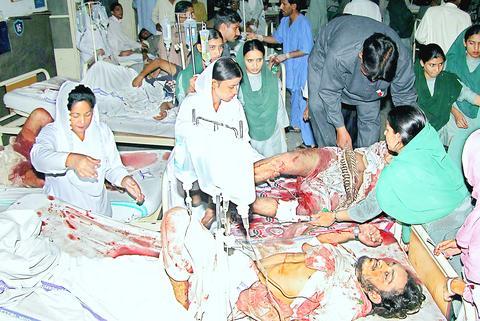Two bombs planted in a car and motorcycle exploded at a gathering of Sunni Muslim radicals in central Pakistan before dawn yesterday, killing at least 40 people and wounding about 100 others in what police suspected was a sectarian attack.
The blasts ripped through a crowd of mourners leaving the overnight rally attended by several thousand in the city of Multan to mark the first anniversary of the shooting of extremist Sunni religious leader Azam Tariq, who was gunned down on the outskirts of Islamabad last October.

PHOTO: EPA
"It was dark and people were screaming for help," said one witness. "It was utter chaos."
About 2,000 angry Sunnis gathered outside a hospital where victims of the explosions in the city of Multan were taken, shouting "Shiites are infidels!" and slogans against the government, witnesses said.
The bombings came less than a week after a suicide attack left 31 dead at a Shiite mosque in the eastern city of Sialkot on Oct. 2 and Information Minister Sheikh Rashid Ahmed said it could have been a sectarian act of revenge.
Prime Minister Shaukat Aziz convened an emergency meeting and the Interior Ministry would propose a ban on large religious gatherings, Interior Minister Aftab Ahmed Khan Sherpao said.
The rally had ended and people were dispersing in pre-dawn darkness from a meeting ground in the Rasheedabad area when the car bomb exploded, said Sikander Hayat, police chief in Multan.
Two minutes later a second bomb attached to a motorcycle went off, deputy city police chief Arshad Hameed said.
Large patches of blood stained the ground and pieces of flesh lay scattered around. Nearby houses and shops were damaged.
Jamil Usmani, 26, who had been standing in a nearby parking lot with friends, said a stampede after the bombing caused many injuries.
"The explosion numbed our ears, we saw people falling on each other, everybody was crying, everybody was running," he said. "Many people were injured in the stampede, we started picking them up and asked passing cars for help."
Most of the casualties were followers of Sipah-e-Sahaba Pakistan (Soldiers of Mohammad's Companions), an outlawed Sunni group that Tariq headed and which has been blamed for many bloody attacks on Shiites, who make up about 15 percent of Pakistan's mainly Sunni population of 150 million.
Sipah-e-Sahaba was one of seven militant groups outlawed by Musharraf after he joined the US-led war on terror following the Sept. 11, 2001 attacks on the US.
Like other such organizations, it took another name after being banned -- Millat-e-Islamia (Islamic Nation). The leader of the renamed group, Maulana Muhammad Ahmed Ludhianvi, blamed Shiite radicals for the blast.
He appealed to his followers to remain calm. But addressing thou-sands gathered to offer funeral prayers, he demanded that the government track down those responsible within a week or he would call for a march on Islamabad.
Abdul Jalil Naqvi, a leader of the main Shiite militant group, the ban-ned Islami Tehrik Pakistan, denied the attack was carried out by Shiites and said it was an act of terrorism aimed at inciting a sectarian war.
"We condemn it," he said.
Officials said about 1,000 police were called from other areas, and soldiers were patrolling the city.

VAGUE: The criteria of the amnesty remain unclear, but it would cover political violence from 1999 to today, and those convicted of murder or drug trafficking would not qualify Venezuelan Acting President Delcy Rodriguez on Friday announced an amnesty bill that could lead to the release of hundreds of prisoners, including opposition leaders, journalists and human rights activists detained for political reasons. The measure had long been sought by the US-backed opposition. It is the latest concession Rodriguez has made since taking the reins of the country on Jan. 3 after the brazen seizure of then-Venezuelan president Nicolas Maduro. Rodriguez told a gathering of justices, magistrates, ministers, military brass and other government leaders that the ruling party-controlled Venezuelan National Assembly would take up the bill with urgency. Rodriguez also announced the shutdown

Civil society leaders and members of a left-wing coalition yesterday filed impeachment complaints against Philippine Vice President Sara Duterte, restarting a process sidelined by the Supreme Court last year. Both cases accuse Duterte of misusing public funds during her term as education secretary, while one revives allegations that she threatened to assassinate former ally Philippine President Ferdinand Marcos Jr. The filings come on the same day that a committee in the House of Representatives was to begin hearings into impeachment complaints against Marcos, accused of corruption tied to a spiraling scandal over bogus flood control projects. Under the constitution, an impeachment by the

China executed 11 people linked to Myanmar criminal gangs, including “key members” of telecom scam operations, state media reported yesterday, as Beijing toughens its response to the sprawling, transnational industry. Fraud compounds where scammers lure Internet users into fake romantic relationships and cryptocurrency investments have flourished across Southeast Asia, including in Myanmar. Initially largely targeting Chinese speakers, the criminal groups behind the compounds have expanded operations into multiple languages to steal from victims around the world. Those conducting the scams are sometimes willing con artists, and other times trafficked foreign nationals forced to work. In the past few years, Beijing has stepped up cooperation

Exiled Tibetans began a unique global election yesterday for a government representing a homeland many have never seen, as part of a democratic exercise voters say carries great weight. From red-robed Buddhist monks in the snowy Himalayas, to political exiles in megacities across South Asia, to refugees in Australia, Europe and North America, voting takes place in 27 countries — but not China. “Elections ... show that the struggle for Tibet’s freedom and independence continues from generation to generation,” said candidate Gyaltsen Chokye, 33, who is based in the Indian hill-town of Dharamsala, headquarters of the government-in-exile, the Central Tibetan Administration (CTA). It